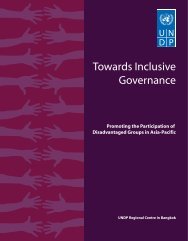Lessons Learned From Rights-Based Approaches in ... - HRBA Portal
Lessons Learned From Rights-Based Approaches in ... - HRBA Portal
Lessons Learned From Rights-Based Approaches in ... - HRBA Portal
You also want an ePaper? Increase the reach of your titles
YUMPU automatically turns print PDFs into web optimized ePapers that Google loves.
PREFACE<br />
Worldwide, there has been a proliferation of literature on the “architecture” of rightsbased<br />
approaches and how the use of such approaches can help br<strong>in</strong>g value <strong>in</strong> terms<br />
of assist<strong>in</strong>g poor, vulnerable and marg<strong>in</strong>alized groups of people realize their basic<br />
human rights. However, as mentioned above, a large volume of such literature has<br />
been dedicated to the “theory” and “usage” of rights-based approaches, viz. the<br />
classification of the pr<strong>in</strong>ciples of rights-based approaches and, how the application of<br />
such pr<strong>in</strong>ciples can be translated <strong>in</strong>to developmental programm<strong>in</strong>g tools to help<br />
achieve outputs that can assist such groups realize their rights. Literature centered<br />
around how developmental agencies, civil society groups and citizens worldwide have<br />
actually used such approaches to demand and claim rights are few and far between.<br />
This compendium of case studies is an attempt towards fill<strong>in</strong>g this space – through a<br />
documentation of experiences from select countries <strong>in</strong> the Asia-Pacific region, these<br />
case studies endeavors to demonstrate how various rights-based approaches/strategies<br />
have been used by developmental agencies and civil society groups, <strong>in</strong>clud<strong>in</strong>g by nongovernmental<br />
organizations (NGOs), community- based organizations (CBOs) and<br />
citizens to successfully demand and claim rights for, and <strong>in</strong> participation with such<br />
poor, vulnerable and marg<strong>in</strong>alized groups groups, often <strong>in</strong> conditions that can at best<br />
be termed challeng<strong>in</strong>g or at times, even <strong>in</strong>hospitable. <strong>From</strong> landless people <strong>in</strong><br />
Bangladesh fight<strong>in</strong>g for their right to land and a livelihood to poor farmers unit<strong>in</strong>g to<br />
advocate for pro-poor farmers’ policies <strong>in</strong> Indonesia to starv<strong>in</strong>g people realiz<strong>in</strong>g their<br />
right to food <strong>in</strong> India to island communities access<strong>in</strong>g the legal and policy systems <strong>in</strong><br />
the Pacific Islands, the cases documented culls together experiences that demonstrates<br />
that by us<strong>in</strong>g approaches that are not only rooted <strong>in</strong> the pr<strong>in</strong>ciples of participation,<br />
empowerment, accountability and transparency but that also looks at good<br />
governance, a receptive policy framework and access to justice as “non-negotiable”<br />
conditions that must exist <strong>in</strong> any country, marg<strong>in</strong>alized and vulnerable groups can<br />
realize their rights.<br />
And the above resonates <strong>in</strong> other cases studies documented - like the one where<br />
marg<strong>in</strong>alized groups of children <strong>in</strong> India have started access<strong>in</strong>g education due to a<br />
receptive Government that implemented a very rights-based policy strategy to<br />
demand<strong>in</strong>g and access<strong>in</strong>g education; similar is another case <strong>in</strong> India where groups of<br />
HIV positive women have successfully lobbied to demand and claim pro-HIV<br />
positive peoples’ polices and whose efforts have been particularly enhanced due to<br />
responsive policy makers and public <strong>in</strong>stitutions respond<strong>in</strong>g to demands on the<br />
supply/duty-bearer side. And <strong>in</strong> Laos, the Government actively worked with other<br />
stakeholders to make the right to water and sanitation a reality for <strong>in</strong>terior rural<br />
mounta<strong>in</strong>ous communities – what is commendable is that these illiterate communities<br />
have worked with the Government stakeholders from <strong>in</strong>ception <strong>in</strong> design<strong>in</strong>g a water<br />
and sanitation system that is not only based on <strong>in</strong>digenous knowledge (and hence,<br />
viable and susta<strong>in</strong>able) but also h<strong>in</strong>ged on Government (and other stakeholders’)<br />
accountability as a requisite; the strategies used have thus enabled the approach to be<br />
replicated on scale <strong>in</strong> other prov<strong>in</strong>ces <strong>in</strong> the country.<br />
7



